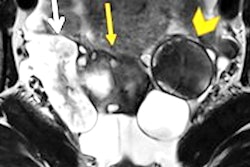
The estrogen receptor (ER) plays a key role in predicting long-term outcomes in patients with ductal carcinoma in situ (DCIS), researchers from Queen Mary University of London reported in a study published online on 16 March in Clinical Cancer Research.
After analyzing samples from the randomized UK/ANZ DCIS trial, the authors led by Dr. Mangesh Thorat, PhD, found multiclonality in ER expression in 11% of ER-positive DCIS. What's more, they concluded that multiclonal ER had a greater than three-fold higher risk of ipsilateral recurrence than ER-negative DCIS. As a result, the researchers said that ER -- and its clonality -- should be routinely assessed in DCIS patients.
"Routine testing of ER in DCIS will help to avoid both overtreatment and undertreatment in this type of breast cancer," Thorat said in a statement from Queen Mary University of London. "The insights from this study will also help improve future breast cancer research through use of new scientific models, particularly in areas of drug resistance and the use of targeted therapies."



















